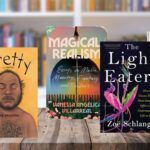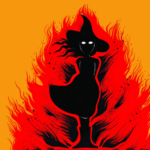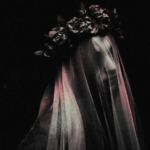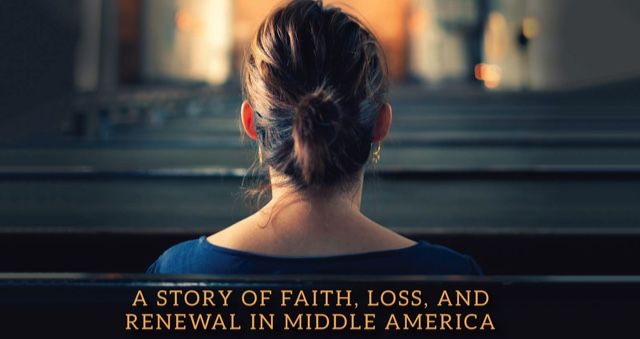
Interview with Lyz Lenz on GOD LAND and Religious and Political Divides
In the wake of the 2016 election, Lyz Lenz watched as her country and her marriage were torn apart by divisions of faith and politics. Lyz was raised homeschooled and attended evangelical churches in the middle of America for her whole life. She married a politically conservative man and struggled for years to find a Christian church where she could truly belong. In God Land, which is both memoir and a work of reporting, she takes a close look at these spaces and communities, and at religion and politics in the Midwest.
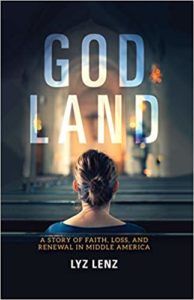 Lyz and I both live in Cedar Rapids, Iowa, and it was my great joy to discuss these important topics with my knowledgeable, investigative, and empathetic friend, Lyz.
Lyz and I both live in Cedar Rapids, Iowa, and it was my great joy to discuss these important topics with my knowledgeable, investigative, and empathetic friend, Lyz.
Emily Stochl: Can you give us an introduction to the book? Where your mindset was when you were writing it?
Lyz Lenz: In 2015, a church that I started closed in a tragic sort of way. The fallout showed a lot of cracks in my life—cracks in my personal life, in my community, and the foundation of my faith. And being a writer, I asked myself what does this mean?
I wrote a story about churches closing up in rural areas, and the sense of loss for the Pacific Standard, right before the Iowa Caucus of 2016. Two months later, Indiana Press emailed me and said they thought the idea should be a book. So for the whole summer of 2016, I was working with Indiana Press on what the book would actually look like. I finally saw a contract for the book in September of 2016. And then I signed it in December 2016. And what happens between that time, well, nothing changed, but we had to see ourselves a whole lot differently.
ES: So the book was an idea before the election?
LL: Yes. The book wasn’t a response to the election. It was going to exist no matter what, but the election did give it urgency. And then of course, my whole personal life started to fall apart, so that all got wrapped into the story.
ES: Right, the book has a lot of personal elements. It’s in a way memoir, about your struggle with faith, while also being a work of journalism. How did you decide to put the personal element into the journalistic reporting?
LL: I didn’t know it was going to be this personal at first. When I signed the book contract, I didn’t know I was going to get divorced. Things were bad, but divorce wasn’t the pressing reality. There was something about the election that made me realize we could not fix it.
It was July 2017 when I realized my story would be so prominent in the book. I went on a week long research trip with a bunch of Baptist ministers in rural Illinois. I knew my marriage was ending. It wasn’t a fun trip for me. It was tough emotionally, and forced me to confront the theology that raised me in a really raw and vulnerable way. I texted some writer friends about what I was feeling, and they told me “this has to go in the book.” My first reaction was that I couldn’t write about my divorce, first of all because it wasn’t official yet. But my friends and other writers saw that my story was too intertwined with the story.
I’m glad I put my story in. The personal breakage mirrored the issues I was researching so well that it didn’t even change the outline of the book. I wove my narrative throughout the research about the communities and churches.
ES: How this intertwines with your personal life goes beyond your marriage and divorce, though. It was also how you were raised. You were homeschooled, raised in a conservative household, and grew up in evangelical churches. When did you start to question the world that raised you?
LL: I think I was always questioning it. I never fit in well. I used to take the church program and write down questions during the service for the pastor. They were never answered genuinely. My memory of this as a child was my parents encouraging me to ask questions, but the response from the authorities was benevolent annoyance. They patted me on the head, but they wouldn’t take me seriously.
That never changed. I kept thinking one day someone would take me seriously, but it never came. There is a pattern for me of being in religious spaces, and either being ignored or asked to leave.
ES: The precipitating result being you come to the realization that while you believe in God, you may not believe in churches. Tell us about that realization.
LL: That moment was in college. See, I’m a people person and I love people coming together—anyone who reads my writing may not believe I’m really a peace maker, but I am!
I think I snapped at that moment. I always believed that even if these church spaces weren’t for me, they might be for other people—I was married to someone who believed in those spaces, after all. I tried to convince myself that there would be space for me, because if everything I believe about faith and religion is true, I’ll find space. But there wasn’t space for me.
I came to realize that my questioning and pushing wasn’t me being obnoxious, it was me just being a person. And it was the spaces that were the problem. I had this idea growing up that I was the problem. The realization that I’m not the problem came much later, during the time my church was failing. I was so tired.
ES: I think a lot of women have had a moment of breaking like that.
LL: My therapist told me that most women have had a similar moment of breaking. Culture tells you that you can do everything and carry the burden of everything. And if you “fail,” then you’re the one to blame. Especially in this political climate. I get messages from lots of moms especially who understand that feeling.
ES: What’s the response been like to the book?
LL: I was worried that the book would be too niche, and only people who identify as Christians would read it. But I want everyone to read it because religion effects everyone in America—it touches everything, like when we schedule school activities, when sports games happen. I wanted people to understand that, and I wanted it to be accessible.
There’s this myth that faith in America is dying—and it’s true that fewer people are showing up to churches—but faith in America is probably just changing. 80% of Americans still say they believe in God. This effects everyone.
It’s been incredible to see the people who the book has resonated with. People of all different faiths have told me the books help them understand America. Or people who were raised evangelical have said it helped them find language for their feelings. Or people who are atheist who have seen dissonance in their community, they say it has helped them better understand others.
ES: Do you feel pressure from readers to solve the problem of that dissonance?
LL: Yes. At every reading people ask me “so what’s the answer?” I can’t just say, “America is divided on religion and this is how we solve it!” I’m not going to do that and the book resists that.
Anyone who offers an answer to this problem—something like, “just get together with your neighbor and talk with them”—those people don’t understand the problem. There’s no easy answer, especially when we don’t understand the problem. And to sit with the problem you have to sit with your own complicity. You can’t just sit and point your fingers at your Trump-supporting in-laws; you have to admit that it’s a lot deeper than that. That our issues are totally woven into the fabric of this country.
ES: I totally understand that. Looking back on the election it was eye-opening to my privilege that those results seemingly came out of nowhere to me. Where were you mentally at that time?
LL: I had written about my politically divided marriage in the 2012 election cycle, but I hadn’t written about it in the 2016 election cycle for many reasons. I had been asked, though. At some point, The View actually called me and said they were looking for couples in politically divided marriages to come on the show the day after the election and talk about what it’s like. I leveled with them—at that point we were in couples therapy like twice a week. There was no way we could do that.
Did I have an idea that Trump would win? Absolutely. Part of my life will always take place in a world where that’s possible. I know so many people who voted for him. Honestly I even think some of them were taken by surprise when he won, too.
ES: What was your experience night of the election?
LL: I knew I couldn’t watch the results come in with my husband. I went to an election party with my neighbor, but at the end of the night I knew I wanted to go home so I wouldn’t break down in front of strangers. I was downing whiskey by the end of it.
My sister who is a sexual assault survivor called me that night and we sobbed on the phone together. I cried all night. I think I had an emotional hangover the next morning. My daughter came into the room that next morning and asked me if “the lady” won, and I just started crying again. And then my next thought was “I was supposed to be on The View right now.”
What I’m trying to say is, even knowing it could happen, the election still caused breakage. It brought so much to the surface for our nation. Stuff that had always been there, but was just easier to ignore under President Obama. When we had something to hide behind.
ES: And now we’re here again. What would you want to say to candidates flocking to Iowa right now about their approach to the Midwest for the 2020 election cycle?
LL: I think people want to hear about spirituality more. I just moderated a panel locally with some Democrat candidates. Backstage Elizabeth Warren was talking about God Land with me, and she mentioned she was raised Methodist and it was a big part of her life. I told her she should talk about that more. She told me she talks about it when she’s asked, but I think she shouldn’t wait to be asked. If it’s an authentic part of who you are, it should be woven into what you talk about.
I believe in separation of church and state, absolutely. But I do think that Democratic candidates should understand that you can speak to the spirit of who we are as people, not just policy, and it would connect with a lot of people. In fact, I think one of the most spiritual presidents we ever had was Barack Obama. Him singing Amazing Grace was one of the most profoundly spiritual moments we’ve ever had as a nation. I wish front runner candidates in this election would understand they need to speak to that spirit. People need their souls fed.
ES: Since we’re talking about the Midwest, I want to talk about the conversation you have in your book about summing up “Midwestern values”—what do you make of the heartland vs urban values conversation?
LL: I think it’s ridiculous. It’s a false binary created to try to make sense of the world. Sure, cities and rural areas are different, but many issues are the same. Rather than an actual divide, I think what it represents is a divide in how we conceive America.
There are a lot of us here in the middle of the country. There is a lot of individuality and complexity. The reporting about the Midwest feels the need to sum us all up into one thing. It’s not as nuanced as it ought to be. Those attempts to define us reduces us to stereotypes and divides.
ES: Your book has to deal with that, too. You wrote about your politics, while also trying to put the points of view of others on the page, too. That must have been challenging to write without summing up or stereotyping. How did you approach that?
LL: The hardest time I had with that was the mystic soul conference—a conference that happens in Chicago annually for underrepresented people to discuss faith. It’s space meant for people of color, and queer people, and I was only there because someone else had vouched for me as a reporter. That was a space where I was so aware of how I rendered what I saw in a way that was thoughtful and respectful, while acknowledging my biases, while also not making it about me. That’s complicated.
At that conference they had appointed people for allies to talk with if they needed to process information. So instead of processing with a person of color, and burdening that person, there were specific people who had volunteered for that role. I talked with one of these women and she gave me this advice: “You’re not going to be able to get this right, no one can. But you do have to try.” I think that fear stops people from struggling with complexity and nuance, especially when it comes to marginalized communities. They think if they can’t get it right they shouldn’t do it at all. But she encouraged me to try my hardest.
I also had a lot of great readers who gave me feedback and helped me render these complex ideas on the page.
ES: Did the communities you visited give you feedback on their chapters?
LL: I let many of them read their chapters. The response was very varied. One of my goals with my writing is not to re-traumatize other people—I’m very aware of this given my sister’s experience with sexual assault. There are assault survivors in the book, and I sent them their stories in advance to get their approval on details that needed to be changed so they would feel safe and wouldn’t feel re-victimized.
That’s different than how I handled the people with more power. For example the Baptist ministers. When I sent them some of their sections for fact checking, I got a really long email that said I was lying and that what I wrote hadn’t happened. But I had over 20 hours of recording, plus all my notes.
In the end they said that I was the problem with America. At first that upset me, but now I think that is good. Writing is supposed to upset people, and if everyone in the book was happy with how they were portrayed, the book would suck. It’s my job as a writer to render people with complexity and honesty, and I do with that what I can.
Actually the most interesting response from people I discuss in the book is silence.
ES: Tell us more about that!
LL: There are a lot of people in the book who I’m sure can recognize themselves—people who still go the churches here in town that I describe. And they’ve mostly been silent. Again it goes back to that silencing technique. If you don’t acknowledge someone, it doesn’t validate their experience. It makes it as though what I experienced wasn’t real. It’s a powerful attempt at erasure.
But one person who I used to go to church with told me they posted a Goodreads review of my book that automatically posted to their personal Facebook, and they got a call from their pastor who scolded them for “promoting heretical gossip.” So I know they know about the book.
ES: What are some resources you read while researching this book that helped you understand the history of churches in America?
LL: One of my favorites is The Family: The Secret Fundamentalism at the Heart of American Power by Jeff Sharlet. It’s also being turned into a Netflix series. This book covers the intentional rise of megachurches and evangelicalism in America, as a way to differentiate ourselves from Communist nations during the Cold War.
This created the environment where the “moral majority” sprung up. It twisted up our notion of what makes a good American, with what is a good Christian, and we still can’t unwind those two things. And another book that talks about that purposeful political movement is One Nation Under God: How Corporate America Invented Christian America by Kevin M. Kruse.
These books show that we didn’t get here by accident, or because Jesus wanted us to. These specific political movements constructed the moment we’re in right now. For example, if you look back to the 1960s even, churches were teaching that life happens when you’re born. But later on it got twisted up in this political movement and anti-abortion sentiment became linked with the church teachings as we know it today. It was very intentional, and I wish people understood that.
I get a lot of angry emails from people who accuse me of wanting to murder babies because I’m pro-choice. But I wish those people understood that they may only believe that because a pastor told them to. And then they could question why that pastor believes that, too. Because the Bible didn’t tell the pastor to believe it. More likely it’s because they’ve been manipulated by a political system that wants to use them to their own ends. It sounds conspiratorial, but it’s absolutely not, and I wish people would try these books and maybe think about that history.
ES: Any other books that informed your research or writing style for this book?
LL: Rescuing Jesus: How People of Color, Women, and Queer Christians are Reclaiming Evangelicalism by Deborah Jian Lee was fundamental in shaping how I approached this book. I’m also very influenced by Kathleen Norris, who is a Catholic writer.
And another book that I loved was Those Who Work, Those Who Don’t: Poverty, Morality, and Family in Rural America by Jennifer Sherman, which I cite often in my book. Jennifer Sherman spent a year as a researcher living in a logging village in rural California as a single woman. What she found about cultural conceptions of morality, space, work, community, and ethics was fascinating. I still think about it.
ES: Last question, what is your favorite thing about living in Iowa?
LL: Hot dish, potlucks, and all that warm, yummy stuff. My favorite is called Cheez-It Casserole, it’s like spaghetti noodles, chicken, cream of chicken noodle soup, sour cream, and it’s cooked with cheddar cheese and Cheez-Its on top! I’ve been thinking about this casserole a lot. But perennially my favorite potluck food is party potatoes.
But you know what I seriously love the most about living in Iowa? Before the LGTBQ Forum with all the Democratic Presidential candidates here in Iowa, I was at a local restaurant with a friend. I mentioned that I didn’t know what jewelry I was going to wear with my outfit to moderate the forum, and the restaurant hostess came over and offered to lend me hers. This person who barely knows me wanted to loan me something to help me out and make me feel good. That’s Iowa.
God Land is out now from Indiana University Press. For more books on reporting complex issues with nuance, check out these 6 Books To Remind Us That Journalism is Important.






